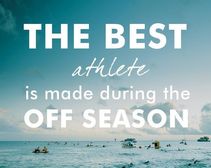|
The off-season. A term that is pretty much non-existent in all-star cheerleading. Sure, some gyms may take a week or two off between the last competition of one season and tryouts for the next season, but it seems that the gap between seasons is narrowing every year. With some gyms even holding tryouts before the final competition of the previous season, this ongoing trend can lead to trouble for the young athletes that participate in this sport. While having an off-season may have a negative connotation to some people, it is a necessary component of the training cycle. With year round sports, not just cheerleading, becoming more prevalent, the incidence of overuse injuries are also increasing, especially in youth athletes. Without taking any time off from high level activities, the body will eventually begin to wear down faster than it can repair itself. When continued for long enough, this can lead to a wide variety of injuries including tendinitis/tendinosis, stress fractures, muscle tears, among others. These types of injuries can vary greatly in severity, though are often avoidable or easily treated if addressed quickly. However, when ignored, they can progress to a point where the body continues to break down, resulting in an even more severe injury, and therefore leading to more time off from the sport. There are a few potential warning signs that may indicate an overuse injury, these include:
 Another potential negative consequence of a lack of off-season is burnout, or mental exhaustion from doing the same thing repetitively without a break. While this is more of a psychological issue, it can also lead to an increased risk of injury. This is because athletes that are not mentally at 100% for their sport may lack focus, desire, or proper mechanics while performing skills. This may lead to injuring, not only themselves, but could also lead to injuries of teammates. So we know there are many potential negative effects of not having a proper off-season, but realistically, this likely isn’t ideal for many coaches or athletes. People in this sport often get the idea that if they are not practicing, they will fall behind their competition. Off-season doesn’t necessarily mean don’t set foot in the gym for a few months, because that would likely lead to more problems and risk for injury upon return. This could mean practicing less often, taking more breaks during practice, or working on any physical deficits an athlete may have to help prevent future injury. Weak core muscles, decreased glute/hamstring strength, lack of flexibility, are all common weaknesses in all-star cheerleaders. Take the time to focus on these areas to help make the return to regular season in your sport easier and decreased the risk of potential injury. Yes, “conditioning” may be boring for some athletes, but there are lots of ways to make it fun! Turn it into a competitions or make a game out of it, this way the athletes are getting the benefit out of the exercises without feeling like they are being punished.
2 Comments
6/18/2021 04:39:57 am
Being a champion is all about how hard you work. No matter how talented you are, if you do not work hard, then there is no real way for you to be great. Personally, I feel like there is no one who wants to work hard on a daily basis, but it is the sacrifice that a champion needs to do. I want to see people work hard to be the best champion that they can be. Talent can only get you to a certain point.
Reply
Leave a Reply. |
Archives
April 2022
Categories
All
Disclaimer: The information contained on this website is compiled from a variety of professional sources as well as the author's own experiences. The information should NOT be used in place of a visit to your healthcare provider or used to disregard any advice provided by your healthcare provider.
|


 RSS Feed
RSS Feed